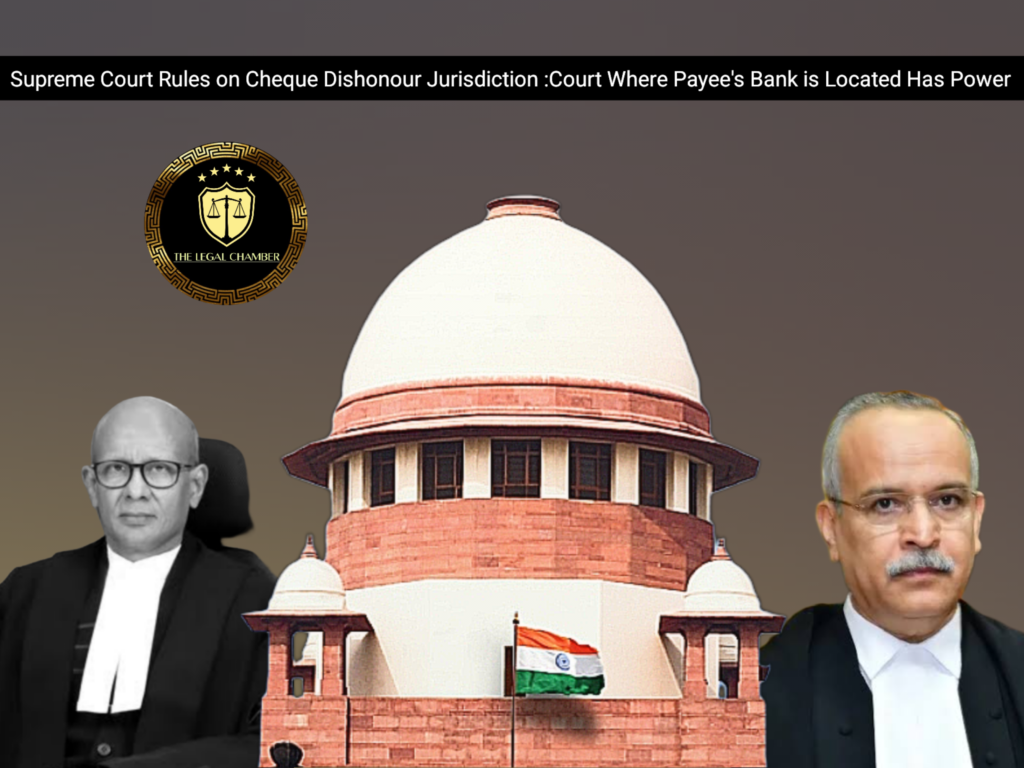
The Supreme Court held that under Section 142(2)(a) of the Negotiable Instruments Act, 1881, jurisdiction for a cheque dishonour case lies exclusively with the court where the payee’s bank branch (for collection) is situated, not where the cheque was physically deposited for credit.
Facts Of The Case:
The appellant, Prakash Chimanlal Sheth, filed complaints under Section 138 of the Negotiable Instruments Act, 1881, concerning four cheques issued by the respondent, Jagruti Keyur Rajpopat. These cheques were dishonored due to insufficient funds. The appellant, who maintained his bank account with the Kotak Mahindra Bank’s Bendurwell Branch in Mangalore, had presented the cheques for collection through the bank’s Opera House Branch in Mumbai to be credited to his Mangalore account. The Judicial Magistrate First Class in Mangalore returned the complaints, holding that it lacked territorial jurisdiction as the drawee bank was in Mumbai. This decision was based on the erroneous assumption that the appellant’s account was maintained in Mumbai. The High Court of Karnataka at Bengaluru dismissed the appellant’s petitions under Section 482 Cr.P.C., confirming the Magistrate’s order. The appellant then appealed to the Supreme Court, contending that the courts below had incorrectly determined the question of territorial jurisdiction.
Procedural History:
The procedural history began with the appellant filing four complaint cases under Section 138 of the Negotiable Instruments Act before the Judicial Magistrate First Class in Mangalore. The Magistrate returned these complaints for presentation before the jurisdictional court, holding that it lacked territorial jurisdiction as the drawee bank was located in Mumbai. Aggrieved by this order, the appellant approached the High Court of Karnataka at Bengaluru by filing petitions under Section 482 of the Cr.P.C. The High Court dismissed these petitions, thereby confirming the Magistrate’s order. The appellant then filed Special Leave Petitions before the Supreme Court, which granted leave and proceeded to hear the appeals, ultimately setting aside the orders of the courts below.
READ ALSO :Supreme Court Upholds Departmental Inquiries: Authority for Minor Penalties Can Issue Major Charge Sheets
Court Observation:
The Supreme Court observed that the courts below proceeded on an erroneous factual assumption that the appellant maintained his account at the bank’s Mumbai branch. Applying the amended Section 142(2)(a) of the Negotiable Instruments Act, 1881, the Court authoritatively held that the territorial jurisdiction for a cheque dishonour case lies exclusively with the court within whose local jurisdiction the branch of the bank where the payee maintains the account is situated. Since the appellant’s account was unequivocally maintained in Mangalore, the Court found that the Magistrate in Mangalore indeed possessed the jurisdiction to try the complaints, and the orders returning them were legally unsustainable.
Final Decision & Judgement:
The Supreme Court allowed the appeals and set aside the impugned orders of the High Court of Karnataka and the Judicial Magistrate in Mangalore. The Court held that the complaints were wrongly returned on the grounds of territorial jurisdiction. It directed the learned Judicial Magistrate First Class, Fifth Court, Mangalore, to entertain and expeditiously adjudicate the appellant’s complaint cases in accordance with law, as the payee’s bank branch was situated within its local jurisdiction.
Case Details:
Case Title:Prakash Chimanlal Sheth vs. Jagruti Keyur Rajpopat Appeal No: Criminal Appeal Nos. of 2025 (@ S.L.P.(Crl.) Nos. 5540-5543 of 2024) Date of Judgement: July 25, 2025 Judges/Justice Name: Justice Sanjay Kumar and Justice Satish Chandra Sharma
Download The Judgement Here